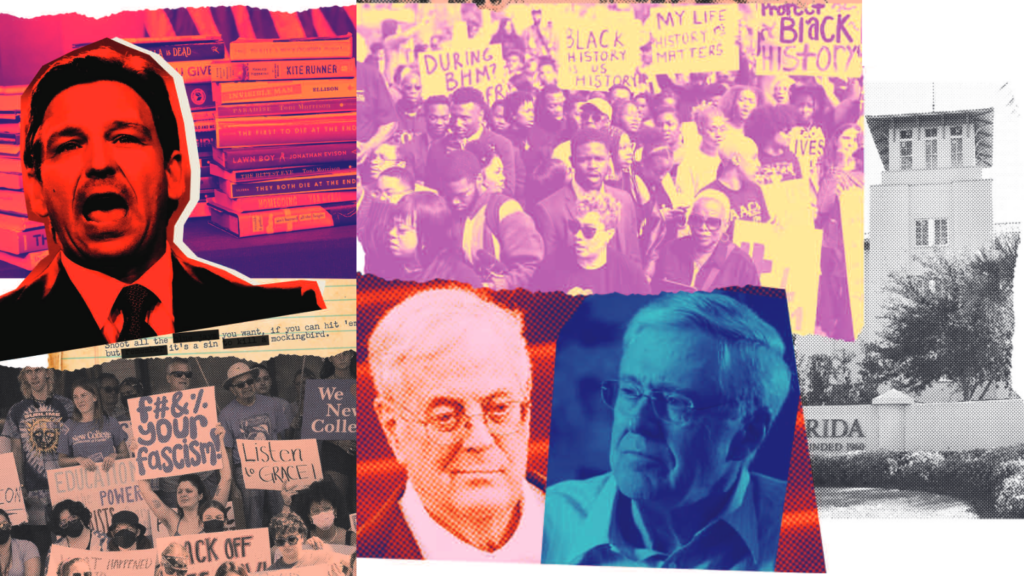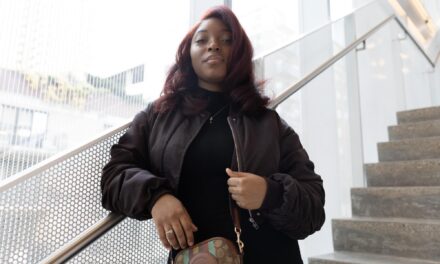For those of us in so-called liberal states, what happens in our backyards is connected to the nationwide suppression of teaching about people of color, queer and trans folks, and women.

Ms. Classroom wants to hear from educators and students being impacted by legislation attacking public education, higher education, gender and sexuality studies, activism and social justice in education, and diversity, equity and inclusion programs. Cue: a new series from Ms., ‘Banned! Voices from the Classroom.’ Submit pitches and/or op-eds and reflections (between 500-800 words) to Ms. contributing editor Aviva Dove-Viebahn at adove-viebahn@msmagazine.com. Posts will be accepted on a rolling basis.
On May 3, a few colleagues and I put on programming in conjunction with the National Day of Action organized by the African American Policy Forum and the National Women’s Studies Association, as well as national civil rights organizations, and local academic and activist organizations.
This action focused on the nationwide sweep of state and local governments and agencies targeting, attacking and working to systematically disrupt the teaching of intersectionality, critical race theory, Black feminism, queer theory, gender studies, and any frameworks that address structural inequality, mass incarceration, white supremacy and heteropatriarchy.
State legislatures, local school districts, and even college boards have removed content, fired teachers, banned books and defunded public libraries.
What is happening to K-12 and higher education in states like Florida, Texas and Kentucky might seem far away from the conditions at my left-leaning small liberal arts college in the state of New York.
Certainly, educators in those states are far more impacted by this intensifying, overt onslaught of what the late bell hooks called imperialist white supremacist heteropatriarchy.
But neoliberal policy and covert hostility constrain teaching and learning about gender studies and ethnic studies in New York state, where legislators have also proposed legislation to remove content—namely critical race theory. Harmful impacts on teaching and learning are insidious, despite assumptions of New England exceptionalism, liberalism and progressive politics.
A reminder that what happens “over there” is always connected to what happens in our own backyards, I have since turned introspective—with an eye towards the struggles at my home institution.
To be sure, we have the blatant anti-BIPOC/queer/trans/women attacks. I recall the cohort of faculty that attempted to block the hiring of a diversity officer, and the faculty who threatened a lawsuit to prevent faculty and staff of color from holding meetings on campus.
But far more pervasive are the covert attacks targeting education about Black, Indigenous and people of color, queer and trans folks, and women. The following is a brief snapshot, accrued in my seven years, of this insidious onslaught at my institution, and, I suspect, other similarly positioned institutions.
Resource Gaps
What might take the form of an outright assault on education in aggressively anti-BIPOC/queer/trans/women educational environments (such as Florida’s legislative proposal to ban gender studies), can manifest differently in less overtly hostile environments—namely, a lack of resource allocation to fields of study dedicated to inquiry on Black, Indigenous, and people of color, queer and trans folks, and women.
I took an inventory.
My field, gender studies, was founded on my campus in the late 1970s; however, we have only a few queer studies offerings and almost nonexistent trans studies competencies among the faculty and curriculum—and this at a place where 35 percent of the student population identify as queer or trans.
Black Studies was founded only in 2019, and Latinx Studies in 2016, appended to an older Latin American Studies Department. We have no Asian American Studies, nor do we have Native American/Indigenous Studies. The latter strikes me as quite ironic given the pervasive regional nomenclature of Mohawk River, Mohawk Valley and the like.
You cannot destroy something that has not even been created.
Regressive Forces
Alongside a dearth of educational infrastructure for the study of structural inequality is a second category of moves aiming to render existing educational programs ineffectual.
One move in this category is to weaponize popular DEI terms for anti-BIPOC/queer/trans/women efforts—for example, the promulgation of “diversity of thought” rhetoric to allow racist, misogynist, homophobic and transphobic ideas to continue unchecked and, further, rebrand them as valid aspects of a well-rounded education.
At my institution, faculty colleagues have indeed brandished this weapon—it is an attempt to neutralize incisive critiques of power by flooding the field.
A second line of attack is to bastardize key concepts developed to diagnose structural inequality—and render them meaningless. I have witnessed colleagues redefine intersectionality as a random assortment of objects that have nothing to do with gender or race; or argue for the condition of being a trailing spouse to be included as a protected category akin to those based on race, national origin, religion, sex, age, disability.
The attempt to gut these concepts is a means towards robbing them of their intellectual rigor and political weight.
There Is no ‘Over There’
We at institutions and in states that lean liberal, even progressive, must stay attuned to the often concealed ways that imperialist white supremacist heteropatriarchy operate on our campuses. It is incumbent upon us all to understand what happens in our backyards as connected to the nationwide suppression of teachings about people of color, queer and trans folks, and women—if we are to have any hope of reversing course.
We all should be asking for more commitment from our institutions to fields of study that center intersectionality, critical race theory, Black feminism, queer theory and gender studies. That may mean demanding new departments be formed, more resources for existing departments, or holding faculty accountable to good faith educational content on systemic inequality.
Up next:
U.S. democracy is at a dangerous inflection point—from the demise of abortion rights, to a lack of pay equity and parental leave, to skyrocketing maternal mortality, and attacks on trans health. Left unchecked, these crises will lead to wider gaps in political participation and representation. For 50 years, Ms. has been forging feminist journalism—reporting, rebelling and truth-telling from the front-lines, championing the Equal Rights Amendment, and centering the stories of those most impacted. With all that’s at stake for equality, we are redoubling our commitment for the next 50 years. In turn, we need your help, Support Ms. today with a donation—any amount that is meaningful to you. For as little as $5 each month, you’ll receive the print magazine along with our e-newsletters, action alerts, and invitations to Ms. Studios events and podcasts. We are grateful for your loyalty and ferocity.




